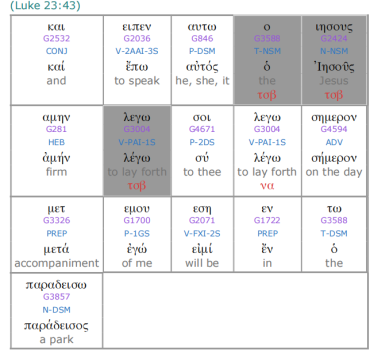Adventageous
Member
Gill was simply mistaken (upon several points), and instead of citing a man, why not see how scripture in all surrounding context applies the puncutation, and see that there is a consistent pattern, until the passage of Luke and its missing comma (these were cited earlier):...
@quitethinker talks about the "comma"...........here you may see it is irrelevant.
...
Luk_23:43 And Jesus said unto him, Verily I say unto thee, To day[,] shalt thou be with me in paradise.
Jhn. 1:51, 3:3,5,11, 5:19,24,25, 6:26,32,47,53, 8:34,51,58, 10:1,7, 12:24, 13:16,20,21,38, 14:12, 16:20,23, 21:18; Mat. 5:18,26, 6:2,5,16, 8:10, 10:15,23,42, 13:17
Joh 1:51 And he saith unto him, Verily, verily, I say unto you, Hereafter ye shall see heaven open, and the angels of God ascending and descending upon the Son of man.
Joh 3:3 Jesus answered and said unto him, Verily, verily, I say unto thee, Except a man be born again, he cannot see the kingdom of God.
Joh 3:5 Jesus answered, Verily, verily, I say unto thee, Except a man be born of water and of the Spirit, he cannot enter into the kingdom of God.
Joh 3:11 Verily, verily, I say unto thee, We speak that we do know, and testify that we have seen; and ye receive not our witness.
Joh 5:19 Then answered Jesus and said unto them, Verily, verily, I say unto you, The Son can do nothing of himself, but what he seeth the Father do: for what things soever he doeth, these also doeth the Son likewise.
Joh 5:24 Verily, verily, I say unto you, He that heareth my word, and believeth on him that sent me, hath everlasting life, and shall not come into condemnation; but is passed from death unto life.
Joh 5:25 Verily, verily, I say unto you, The hour is coming, and now is, when the dead shall hear the voice of the Son of God: and they that hear shall live.
Joh 6:26 Jesus answered them and said, Verily, verily, I say unto you, Ye seek me, not because ye saw the miracles, but because ye did eat of the loaves, and were filled.
Joh 6:32 Then Jesus said unto them, Verily, verily, I say unto you, Moses gave you not that bread from heaven; but my Father giveth you the true bread from heaven.
Joh 6:47 Verily, verily, I say unto you, He that believeth on me hath everlasting life.
Joh 6:53 Then Jesus said unto them, Verily, verily, I say unto you, Except ye eat the flesh of the Son of man, and drink his blood, ye have no life in you.
Joh 8:34 Jesus answered them, Verily, verily, I say unto you, Whosoever committeth sin is the servant of sin.
Joh 8:51 Verily, verily, I say unto you, If a man keep my saying, he shall never see death.
Joh 8:58 Jesus said unto them, Verily, verily, I say unto you, Before Abraham was, I am.
Joh 10:1 Verily, verily, I say unto you, He that entereth not by the door into the sheepfold, but climbeth up some other way, the same is a thief and a robber.
Joh 10:7 Then said Jesus unto them again, Verily, verily, I say unto you, I am the door of the sheep.
Joh 12:24 Verily, verily, I say unto you, Except a corn of wheat fall into the ground and die, it abideth alone: but if it die, it bringeth forth much fruit.
Joh 13:16 Verily, verily, I say unto you, The servant is not greater than his lord; neither he that is sent greater than he that sent him.
Joh 13:20 Verily, verily, I say unto you, He that receiveth whomsoever I send receiveth me; and he that receiveth me receiveth him that sent me.
Joh 13:21 When Jesus had thus said, he was troubled in spirit, and testified, and said, Verily, verily, I say unto you, that one of you shall betray me.
Joh 13:38 Jesus answered him, Wilt thou lay down thy life for my sake? Verily, verily, I say unto thee, The cock shall not crow, till thou hast denied me thrice.
Joh 14:12 Verily, verily, I say unto you, He that believeth on me, the works that I do shall he do also; and greater works than these shall he do; because I go unto my Father.
Joh 16:20 Verily, verily, I say unto you, That ye shall weep and lament, but the world shall rejoice: and ye shall be sorrowful, but your sorrow shall be turned into joy.
Joh 16:23 And in that day ye shall ask me nothing. Verily, verily, I say unto you, Whatsoever ye shall ask the Father in my name, he will give it you.
Joh 21:18 Verily, verily, I say unto thee, When thou wast young, thou girdedst thyself, and walkedst whither thou wouldest: but when thou shalt be old, thou shalt stretch forth thy hands, and another shall gird thee, and carry thee whither thou wouldest not.


